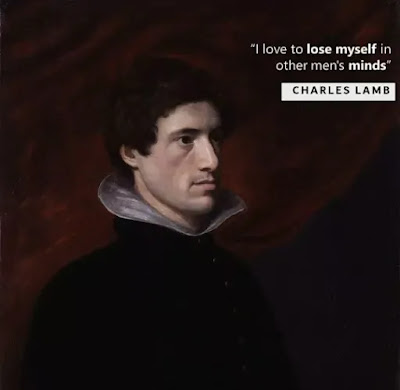Also Read
As an essayist, it is Charles Lamb's (1775-1834) chief distinction that he introduced the intimate, familiar essay in English literature, which inspired many subsequent writers. "He does not attempt to show how many fine things he can say on a hackneyed subject". He deals with his memory of simple things and simple people with pathos and humor as the case may be and makes them familiar before our eyes and makes us look at them in a new light. He is the romancer of the London streets and London life. His choice of subjects is astonishingly varied. The street Cries, the clinging church bells, the chimney sweepers, the beggers, the clerks, the Jews, the actors-in short, the whole teeming multitudes of the metropolis are touched with new grace and beauty in his essays.
Lamb is also a lover of the lower animals-beasts and fish which are presented with a new flavor. Lastly, no man ever spoke in print more intimately than Lamb. It is the man Lamb-not the individual but Lamb as connected with his numerous friends and objects of London, that is the chief subject of the essay. Thus the essays of Lamb have the charm and aroma of delightful self-revelations. There is no strain of vulgarity vanity or egotism in his essays. He does not sentimentalize but only poetizes his memory. He always takes the readers into confidence, establishes the bond of sympathy with them and speaks with an engaging frankness, mingling fact with fiction and thus making the essay an interesting work of art. The Essays of Elia are autobiographical fragments. It is possible to reconstruct with little difficulty the inner as well as outer life of Lamb. This intimate, personal note of the essay is Lamb's main contribution to the English essay and it takes us back to the method of Montaigne, the father of the essay. To quote Albert, "No essayist is more egoistical than Lamb; but no egoist can be so artless and yet so artful, so tearful and yet so mirthful, pedantic and yet so humane."
Among the literary characteristics of Lamb are his imagination of a poet, inimitable humor that is a blend of laughter and tears (called rainbow humor and his individualistic style, which ranges from the plain, businesslike and conversational to the most colored, musical and poetical. The essays show the lively imagination and amiable personality of Lamb. They are filled with humor and humanity. Among his essays, mention may be made of Dream Children, The Superannuated Man, Oxford in the Vacation, The Old Schoolmaster and the New, My Relatives, The two Races of Man etc. These are superb works of art.
Charles Lamb is the perfector of the literary type of essay - essays personal, subjective and literary. In the romantic age, subjective essays came to be written. Leigh Hunt in his Indicator revived the manner, style and quiet narrative of Steele. Hazlitt in his Table Talk and The Spirit of the Age, and Jeffrey in the Edinburgh Revie took to literary criticism and raised the standard of literary taste. Hazlitt's essays are characterized by a lucidity of style and frankness. Coleridge sometimes much more subtle than Lamb is a metaphysician. De Quincey is often too imaginative in his conceptions and florid in his style. Wordsworth is too busy in setting up his theory in imaginative prose of limpid lucidity. But Lamb is imaginative in setting and romantic. In his essays, there is the stamp of his loveable personality.
Lamb's essays are confidential chatters; they are rich in autobiographical pathos and wide sympathy for humanity. Wit and humor light up all his essays. His style is a strange medley of Elizabethan conceits and seventeenth-century turns of expression yet it is intensely personal. He gives to the essays the quality of imagination. He unburdens his heart to the readers. But he does not egotize, nor does he sublimate himself into a great figure. He does not teach like Addison and admonish like Johnson. Addison's essays are intellectual; Lamb's essays are imaginative and subjective. A general confidential mood pervades the essays, Dream-Children. My Relations, Oxford in The Vacation, South Sea House, The Old Schoolmaster, and the new, The Two Races of Man are superb creations of subjective art. Lucas has rightly observed: "Lamb found the essay a comparatively frigid thing: he left it warm and flexible and companionable". But Lamb is an individual apart. To write like Lamb is indeed the surest way to literary disaster. His essays however influenced later writers like Stevenson, Chesterton, E. V. Lucas, A. G. Gardiner, etc.
